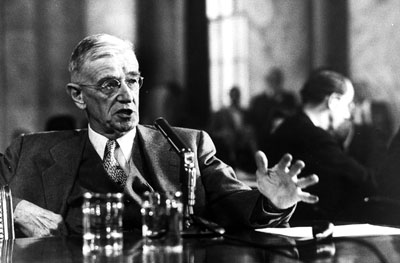
Bush was a man who believed in the power of science. He wanted to see science take humanity to new depths of knowledge. He wanted scientists to find a means to fascilitate humans storing and recalling large amounts of data and information in order to be able to progress faster as a human race. He urged scientists to rally to this cause after World War II was over. He insisted that technology was advancing rapidly and that this dream of his was in fact realistic. Bush also argues that mechanizing systems allows them to be performed far more accurately than with human involvement.
He was far ahead of his time, predicting how technologies like machine learning, voice-command, personal computers, and the Internet would eventually come to function and change the way we store, recall, and learn information altogether. He saw the need for a shared "web" of ideas and resources which could take humanity to new heights of knowledge.

Almost thirty years from when the Internet was born, it is still so young. The foundation of the web really is equity, universal access, and net neutrality. There are many threats in our world today on this foundation. But in order to advance at the rapid pace we must, the web must remain accessible and expand accessibility. It is through shared thought and shared learning that we will truly be able to advance our collective knowledge and resolve our collective struggles. We have so much data at our fingertips, as Bush envisioned in 1945. It is up to everyone today to preserve these opportunities and take them to new heights.
